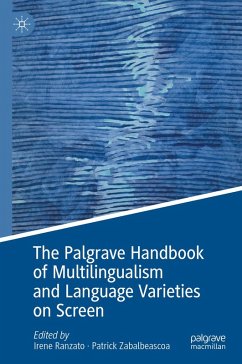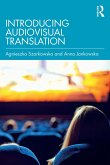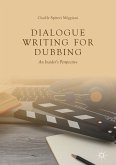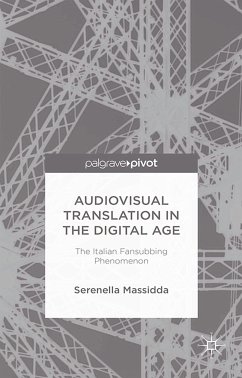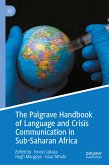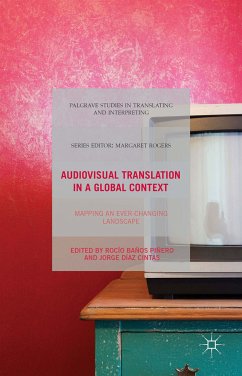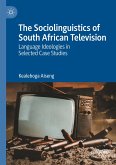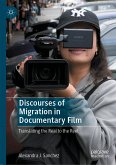The Palgrave Handbook of Multilingualism and Language Varieties on Screen (eBook, PDF)
Redaktion: Ranzato, Irene; Zabalbeascoa, Patrick


Alle Infos zum eBook verschenken

The Palgrave Handbook of Multilingualism and Language Varieties on Screen (eBook, PDF)
Redaktion: Ranzato, Irene; Zabalbeascoa, Patrick
- Format: PDF
- Merkliste
- Auf die Merkliste
- Bewerten Bewerten
- Teilen
- Produkt teilen
- Produkterinnerung
- Produkterinnerung

Hier können Sie sich einloggen

Bitte loggen Sie sich zunächst in Ihr Kundenkonto ein oder registrieren Sie sich bei bücher.de, um das eBook-Abo tolino select nutzen zu können.
This handbook brings together contributions from the main experts in the field of multilingualism and language varieties (including dialects, accents, sociolects, and idiolects of specific speech communities) as expressed in fictional dialogue on-screen in films, and television series. The chapters included in the volume cover both the representation of these varieties and multilingual situations on screen as well as their translation into a range of languages. The handbook will thus be an essential resource for scholars and students in diverse fields including translation studies, audiovisual…mehr
- Geräte: PC
- ohne Kopierschutz
- eBook Hilfe
- Größe: 22.66MB
![Introducing Audiovisual Translation (eBook, PDF) Introducing Audiovisual Translation (eBook, PDF)]() Agnieszka SzarkowskaIntroducing Audiovisual Translation (eBook, PDF)39,95 €
Agnieszka SzarkowskaIntroducing Audiovisual Translation (eBook, PDF)39,95 €![Dialogue Writing for Dubbing (eBook, PDF) Dialogue Writing for Dubbing (eBook, PDF)]() Giselle Spiteri MiggianiDialogue Writing for Dubbing (eBook, PDF)73,95 €
Giselle Spiteri MiggianiDialogue Writing for Dubbing (eBook, PDF)73,95 €![Audiovisual Translation in the Digital Age (eBook, PDF) Audiovisual Translation in the Digital Age (eBook, PDF)]() S. MassiddaAudiovisual Translation in the Digital Age (eBook, PDF)40,95 €
S. MassiddaAudiovisual Translation in the Digital Age (eBook, PDF)40,95 €![The Palgrave Handbook of Language and Crisis Communication in Sub-Saharan Africa (eBook, PDF) The Palgrave Handbook of Language and Crisis Communication in Sub-Saharan Africa (eBook, PDF)]() The Palgrave Handbook of Language and Crisis Communication in Sub-Saharan Africa (eBook, PDF)186,95 €
The Palgrave Handbook of Language and Crisis Communication in Sub-Saharan Africa (eBook, PDF)186,95 €![Audiovisual Translation in a Global Context (eBook, PDF) Audiovisual Translation in a Global Context (eBook, PDF)]() Audiovisual Translation in a Global Context (eBook, PDF)89,95 €
Audiovisual Translation in a Global Context (eBook, PDF)89,95 €![The Sociolinguistics of South African Television (eBook, PDF) The Sociolinguistics of South African Television (eBook, PDF)]() Kealeboga AisengThe Sociolinguistics of South African Television (eBook, PDF)97,95 €
Kealeboga AisengThe Sociolinguistics of South African Television (eBook, PDF)97,95 €![Discourses of Migration in Documentary Film (eBook, PDF) Discourses of Migration in Documentary Film (eBook, PDF)]() Alexandra J. SanchezDiscourses of Migration in Documentary Film (eBook, PDF)73,95 €
Alexandra J. SanchezDiscourses of Migration in Documentary Film (eBook, PDF)73,95 €-
-
-
Dieser Download kann aus rechtlichen Gründen nur mit Rechnungsadresse in A, B, BG, CY, CZ, D, DK, EW, E, FIN, F, GR, HR, H, IRL, I, LT, L, LR, M, NL, PL, P, R, S, SLO, SK ausgeliefert werden.
- Produktdetails
- Verlag: Springer International Publishing
- Seitenzahl: 645
- Erscheinungstermin: 26. September 2024
- Englisch
- ISBN-13: 9783031616211
- Artikelnr.: 71792895
- Verlag: Springer International Publishing
- Seitenzahl: 645
- Erscheinungstermin: 26. September 2024
- Englisch
- ISBN-13: 9783031616211
- Artikelnr.: 71792895
- Herstellerkennzeichnung Die Herstellerinformationen sind derzeit nicht verfügbar.
